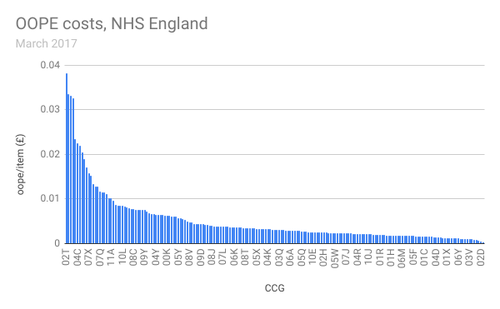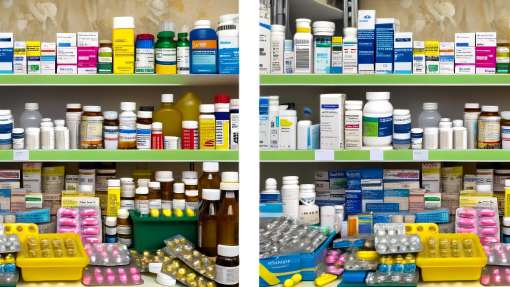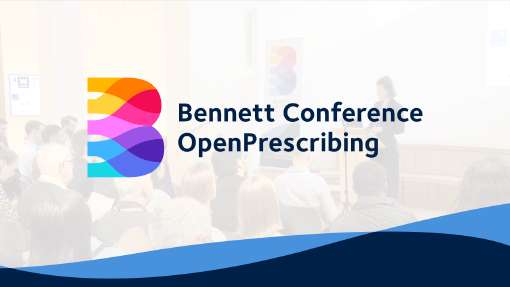Dispensing data shows huge variation in Out of Pocket Expenses
- Authors:
-
Posted:
- Categories:

Each year, we estimate there are up to £5m of Out of Pocket Expenses (OOPE) expenses charged to the NHS, added by dispensing contractors to their invoices. Could some of these expenses be reduced? In 2014/15 NHS Islington CCG wrote to dispensing contractors highlighting such expenses, and from this single intervention achieved a 50% reduction; spread across the country this could amount to a saving of £2.5m.
We’ve done some initial investigations, but don’t have resources to follow up in detail. This post is to note what we’ve found so far. If you are interested in finding out more, and have access to funding, let us know!
We run most of our analyses against the monthly Practice Level Prescribing Data. This describes (more-or-less) how GP Practices prescribe each month. The data actually originates in reimbursement claims made by dispensing contractors (such as pharmacies). So, earlier this year we made a Freedom of Information request to get the data grouped by dispenser. Grouping in this way allows us to see if there is interesting variation in dispensing, as well as in prescribing.
We looked at a single month of data (March 2017). In that month there were 11,800 active contractors, each dispensing an average of 9,200 prescriptions. The contractor with the highest turnover for NHS dispensing was Boots PLC, who dispensed about 2 million prescriptions, at a cost of slightly over £108 million.
We found that the most interesting data relates to OOPE. These are expenses that a contractor has incurred as a direct cost, during the process of obtaining items. These must only be claimed in exceptional circumstances. Examples given in the guidance are postage and packing, or the cost of phone calls. We’ve done a basic analysis here, which you should be able to follow if you understand some Python and SQL. We found that there is wide variance in the amount each CCG pays in OOPE:

Our summary findings (for March 2017) are:
- In that month, there were £407,000 of Out of Pocket Expenses in total. While a tiny amount compared with the total prescribing spend in England (just under £700 million for that month), there is still some interesting variation.
- The majority of contractors (62%) never add any expenses at all, to any of their dispensing. There are 13 contractors, by contrast, who have a mean OOPE of at least £10 per prescription item (where any expenses are claimed).
- Just 5 dispensing contractors together added a massive £39,000 expenses in a single month — worth 10% of their total revenue The most expensive product across the whole NHS for OOPE is Cinacalcet Tablets 30mg, which incurs £16,000 per month in out of pocket expenses.
- The most expensive single expense was on a pack of medicated stockings. They would normally cost £87.50, but had £293.50 of OOPE added in this case.
- The most expensive product classes overall are Vitamin D (£67,000 per month); Foods for Special Diets (£52,000 per month); and Enteral Nutrition (£43,000 per month).
- Sometimes we see curiously fixed amounts for OOPE. For example, the amounts £20.99, £30.99 and £36.98 account for over 10% of all OOPE costs. These fixed charges are as likely to be applied to a cheap 44p bottle of tablets, as an special solution at £1,570 per syringe.
Here are some questions we’d like to answer, if we can get more resources:
- How does the picture change over time? Does variance in the amount of OOPE change, for example?
- Which CCGs are paying more on OOPEs than others? Is there a pattern in this? Is there any geographic variation in OOPEs?
- Why do so many items such as Vitamin D, which are readily available online, and in all good pharmacies and supermarkets, appear in OOPEs data when they should only be claimed in exceptional circumstances?
- Do items that have large OOPEs follow a certain pattern, or are OOPEs randomly distributed across all products?
- What are the fixed-price OOPEs? Are there other fixed levels we can find in the data?
If you know the answers to any of these questions or have access to funding, to support us finding out more, please get in touch at feedback@openprescribing.net








